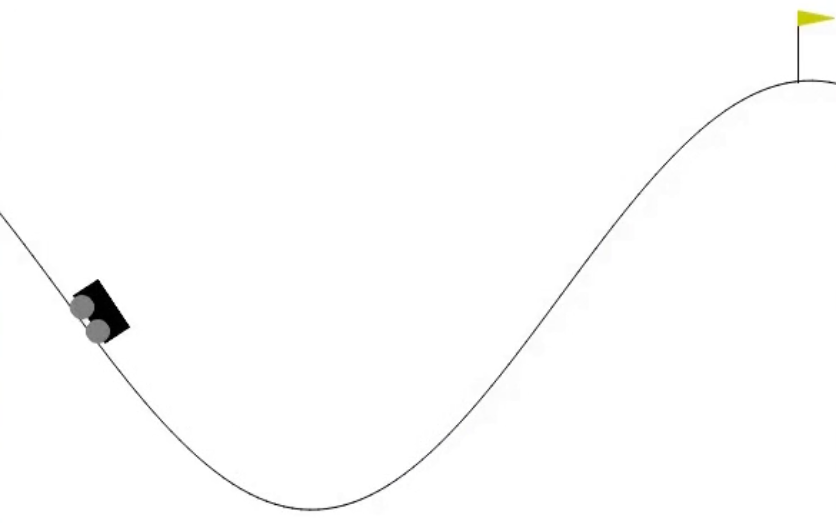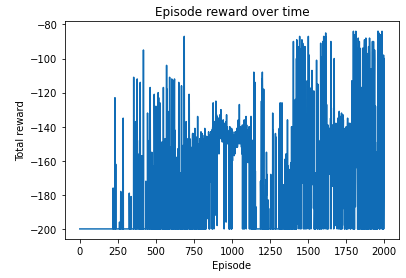
Double Deep Q-Network
In double DQNs, we use a separate network to estimate the target rather than the prediction network. The separate network has the same structure as the prediction network. And its weights are fixed for every T episode (T is a hyperparameter we can tune), which means they are only updated after every T episode. The update is simply done by copying the weights of the prediction network. In this way, the target function is fixed for a while, which results in a more stable training process.
Mathematically, double DQNs are trained to minimize the following error term:
![]()
Here, s’ is the resulting state after taking action, a, in state s; r is the associated reward; α is the learning rate; and γ is the discount factor. Also,Q_T is the function for the target network, and Q is the function for the prediction network.
Importing Basic Libraries
#Import the library
import gym
import torch
from collections import deque
import random
import copy
from torch.autograd import VariableMake the environment
torch.manual_seed(0)
#connecting python script to gpu
device = 'cuda' if torch.cuda.is_available() else 'cpu'
env = gym.envs.make("MountainCar-v0")Class for Deep Q Network with target network along with experience replay
class DQN():
def __init__(self, n_state, n_action, n_hidden=50, lr=0.05):
self.criterion = torch.nn.MSELoss()
self.model = torch.nn.Sequential(
torch.nn.Linear(n_state, n_hidden),
torch.nn.ReLU(),
torch.nn.Linear(n_hidden, n_hidden),
torch.nn.ReLU(),
torch.nn.Linear(n_hidden, n_action)
)
self.model_target = copy.deepcopy(self.model)
self.optimizer = torch.optim.Adam(self.model.parameters(), lr)
def update(self, s, y):
"""
Update the weights of the DQN given a training sample
@param s: state
@param y: target value
"""
y_pred = self.model(torch.Tensor(s))
loss = self.criterion(y_pred, Variable(torch.Tensor(y)))
self.optimizer.zero_grad()
loss.backward()
self.optimizer.step()
def predict(self, s):
"""
Compute the Q values of the state for all actions using the learning model
@param s: input state
@return: Q values of the state for all actions
"""
with torch.no_grad():
return self.model(torch.Tensor(s))
def target_predict(self, s):
"""
Compute the Q values of the state for all actions using the target network
@param s: input state
@return: targeted Q values of the state for all actions
"""
with torch.no_grad():
return self.model_target(torch.Tensor(s))
def replay(self, memory, replay_size, gamma):
"""
Experience replay with target network
@param memory: a list of experience
@param replay_size: the number of samples we use to update the model each time
@param gamma: the discount factor
"""
if len(memory) >= replay_size:
replay_data = random.sample(memory, replay_size)
states = []
td_targets = []
for state, action, next_state, reward, is_done in replay_data:
states.append(state)
q_values = self.predict(state).tolist()
if is_done:
q_values[action] = reward
else:
q_values_next = self.target_predict(next_state).detach()
q_values[action] = reward + gamma * torch.max(q_values_next).item()
td_targets.append(q_values)
self.update(states, td_targets)
def copy_target(self):
self.model_target.load_state_dict(self.model.state_dict())
The Function for Epsilon Greedy Policy
def gen_epsilon_greedy_policy(estimator, epsilon, n_action):
def policy_function(state):
if random.random() < epsilon:
return random.randint(0, n_action - 1)
else:
q_values = estimator.predict(state)
return torch.argmax(q_values).item()
return policy_functionThe deep Q Learning Function
def q_learning(env, estimator, n_episode, replay_size, target_update=10, gamma=1.0, epsilon=0.1,epsilon_decay=.99):
"""
Deep Q-Learning using double DQN, with experience replay
@param env: Gym environment
@param estimator: DQN object
@param replay_size: number of samples we use to update the model each time
@param target_update: number of episodes before updating the target network
@param n_episode: number of episodes
@param gamma: the discount factor
@param epsilon: parameter for epsilon_greedy
@param epsilon_decay: epsilon decreasing factor
"""
count = 0
for episode in range(n_episode):
if episode % target_update == 0:
estimator.copy_target()
policy = gen_epsilon_greedy_policy(estimator, epsilon, n_action)
state = env.reset()
is_done = False
while not is_done:
action = policy(state)
next_state, reward, is_done, _ = env.step(action)
total_reward_episode[episode] += reward
memory.append((state, action, next_state, reward, is_done))
if is_done:
break
estimator.replay(memory, replay_size, gamma)
state = next_state
total_reward.append(total_reward_episode[episode])
print('Episode: {}, total reward: {}, epsilon: {}'.format(episode, total_reward_episode[episode], epsilon))
if(total_reward_episode[episode] > -200):
count = count + 1
epsilon = max(epsilon * epsilon_decay, 0.01)
print(count)Parameters and hyperparameters
n_state = env.observation_space.shape[0]
n_action = env.action_space.n
n_hidden = 50
lr = 0.01Instantiation of the DQN object
dqn = DQN(n_state, n_action, n_hidden, lr)
memory = deque(maxlen=10000)
n_episode = 2000
replay_size = 20
target_update = 10
total_reward_episode = [0] * n_episode
total_reward = []Calling the Q learning Function
q_learning(env, dqn, n_episode, replay_size, target_update, gamma=1, epsilon=0.1)Here, out of 2000 episodes the agent was able to complete its task in 1026 episodes.
Plotting the rewards over time
import matplotlib.pyplot as plt
plt.plot(total_reward_episode)
plt.title('Episode reward over time')
plt.xlabel('Episode')
plt.ylabel('Total reward')
plt.show()
Testing the trained agent
episodes = 1000
total_reward = []
count = 0
for episode in range(episodes):
#Using the trained estimator to run one episode of the MountainCar
state = env.reset()
is_done = False
total_reward_episode = 0
while not is_done:
q_values = dqn.predict(state)
#print(q_values)
best_action = torch.argmax(q_values).item()
#print(best_action)
next_state, reward, is_done, _ = env.step(best_action)
state = next_state
total_reward_episode += reward
#print(total_reward_episode)
if(total_reward_episode > -200):
count = count + 1
total_reward.append(total_reward_episode)print(count)
print(sum(total_reward)/episodes)The trained agent was successful to complete the task in 682 episodes out of 1000 episodes.
The average score of trained agent is -152.827
Saving the DQN object for future use
import pickle
def save_object(obj, filename):
with open(filename, 'wb') as outp:
pickle.dump(obj, outp, pickle.HIGHEST_PROTOCOL)
save_object(dqn, 'double_dqn_colab.pkl')Loading the trained object and putting it in action
file_to_read = open("double_dqn_colab.pkl", "rb")
loaded_DQN = pickle.load(file_to_read)
state = env.reset()
is_done = False
total_reward_episode = 0
while not is_done:
env.render()
time.sleep(0.05)
q_values = loaded_DQN.predict(state)
best_action = torch.argmax(q_values).item()
next_state, reward, is_done, _ = env.step(best_action)
state = next_state
total_reward_episode += reward
print(total_reward_episode)